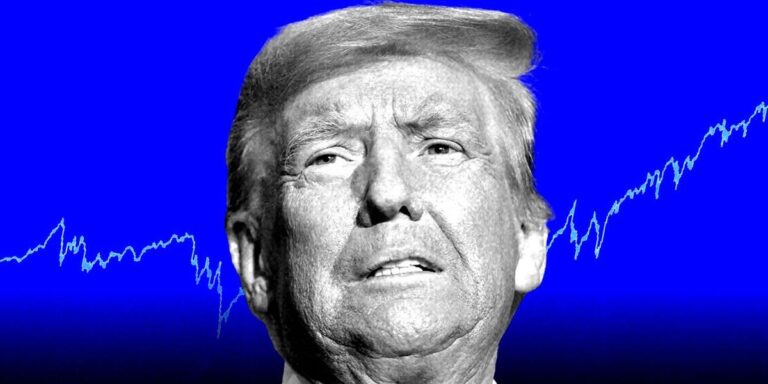- Donald Trump has touted plans to raise trade barriers and replace income taxes with tariffs.
- That sparked a wave of criticism, with many economists warning of inflation and trade wars.
- But other experts say the policy will be diluted in Congress, with less impact.
With the chances of a Donald Trump White House growing, economists and market forecasters have been scrambling to imagine what the new regime might look like.
As with most things Trump-related, there are serious differences of opinion, and his fiscal platform is no different. Experts have widely differing views, creating a new hot topic that will continue to be debated until the November election.
Trump’s proposed fiscal path has several elements, the first of which is tariffs. In an effort to favor U.S. trade, Trump has made massive tariffs a cornerstone of his international platform. Nearly all U.S. imports would be taxed at 10%, he said, though tariffs would go as high as 60% on major competitors, such as China. It’s a far more aggressive approach than Biden’s actions so far, which have included a 100% tariff on Chinese electric vehicles.
Trump has also floated the idea of using tariffs as a replacement for a U.S. income tax. The plan has been well received by Republican lawmakers who first heard it.
But in certain economic circles, many disagree with this policy, warning of rising prices and a global trade war.
The camp that strongly opposes Trump’s policies
The basic argument against Trump’s fiscal platform is that tariffs are inherently inflationary. According to the nonpartisan Tax Foundation, when imports are taxed, their producers raise prices or pull their products. That reduces supply, raising the cost of domestic goods as well.
JPMorgan’s chief global strategist, David Kelly, called the proposal a “potion for stagflation.” That description was disputed by former Treasury Secretary Larry Summers, who characterized the idea of replacing the income tax as “the mother of all stagflation.”
Furthermore, Nobel Prize-winning economist Paul Krugman recently argued in a New York Times op-ed that Trump’s proposed tariffs would benefit only the wealthiest Americans. He also predicted that 80% of U.S. consumers would lose after-tax income.
In numerical terms, Goldman Sachs estimates that the policy would cause U.S. GDP to shrink by 0.5%, while inflation would rise by 1.1 percentage points. The firm says that’s enough to force a 130 basis point interest rate hike, at a time when most investors want borrowing costs to fall.
The Peterson Institute offers a more drastic outcome: a full-blown global trade war. The nonpartisan think tank notes that the last time blanket tariffs were imposed nearly a century ago, they contributed to the Great Depression.
But not everyone shares this level of skepticism.
The camp that says it won’t be as bad as feared
Longtime market expert Ed Yardeni, president and chief investment strategist at Yardeni Research, falls into this group.
In a recent opinion piece in the Financial Times , he cited the “good” impact that Trump’s first-term tariffs had on the US economy. He noted that real GDP rose a record 8.5% between the fourth quarter of 2016 and the fourth quarter of 2019, just before the pandemic. Furthermore, inflation remained around 2% during that period.
As the new term approaches, Yardeni argues that Trump’s most extreme efforts are likely to be tempered by Congress. He also says the Republicans’ pro-business support for oil and gas production will depress consumer prices and ward off inflationary pressures.
Famed “Big Short” investor Steve Eisman was outspokenly skeptical of the impact of inflation in a recent CNBC interview:
“Do I think Donald Trump will raise tariffs on China? Absolutely. Do I think it will have a huge inflationary impact on the U.S.? I think that’s ridiculous.”
Republican donor Kyle Bass — who serves as chief investment officer of Hayman Capital Management — has taken a different stance in his support of Trump’s fiscal agenda, arguing that Trump is deliberately overstating his plans, and that what he will actually enact will be more restrained.
“Hyperbole is useful for kicking the hornet’s nest,” he told CNBC last month.
This ultimately depends on Congress.
Nobel Prize-winning economist Joseph Stiglitz represents something of a middle ground between the two polarized factions. While he was one of 16 economists who signed an open letter warning that Trump’s policies could raise inflation, he also said — similar to Yardeni — that much depends on Congress.
“I think the general consensus, not just my view, but pretty much anyone who models what’s going on would say the Trump administration is going to be more inflationary,” he told Business Insider. “How much inflationary it is going to be depends on how radical they are. And that depends on where Congress is.”
The chart below from Oxford Economics shows this unique dynamic in action. While a “full-power Trump” administration would be the most inflationary outcome during the next presidential term, the data suggests that a Trump victory under divided government would be less inflationary than a “base Biden” regime.


